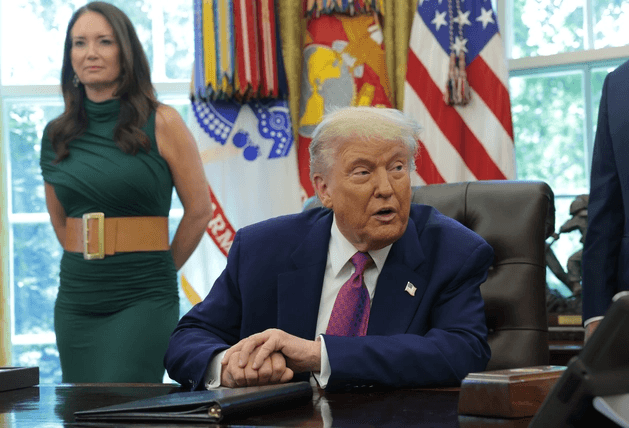Political Peril Spurs Trump to Act on Beef Prices Even as Ranchers Rage

President Donald Trump, joined by Agriculture Secretary Brooke Rollins, delivers a statement in the Oval Office at the White House on June 10, 2025 in Washington, DC. | Anna Moneymaker/Getty Images
The Trump administration is facing growing political pressure over soaring beef prices, prompting President Donald Trump to take action that has angered one of his most loyal political constituencies America’s cattle ranchers.
In recent weeks, Trump has repeatedly voiced frustration over rising grocery costs, promising Americans that he would “bring the price down.” The administration’s latest proposal — to quadruple U.S. beef imports from Argentina has triggered a wave of backlash from farm-state Republicans and agriculture groups, who say the move undermines domestic ranchers already struggling with high production costs.
Balancing Politics and Policy
Trump’s election campaign heavily emphasized lowering the cost of living, particularly food prices. Ten months into his new term, the White House is under pressure to deliver on that promise as voters feel the pinch of stubborn grocery inflation.
Officials close to the administration say Trump believes it’s worth angering ranchers temporarily if it helps reduce beef prices for consumers. One adviser compared the situation to the recent egg price crisis, describing the effort as a politically necessary step to show the administration is “fighting for consumers.”
According to Federal Reserve data, the average price for a pound of ground beef has risen to $6.32, a 14% increase since Trump returned to office. Beef remains one of the biggest drivers of overall food inflation.
The Argentina Plan Sparks Backlash
The administration’s proposal to import 80,000 metric tons of beef from Argentina four times the usual amount was unveiled shortly after Trump met with Argentina’s President Javier Milei at the White House on October 14. The two leaders reportedly discussed trade cooperation over a dinner featuring chargrilled beef filet.
Officials say the expanded imports are designed to increase U.S. beef supply and lower prices in the short term. The plan also aligns with the administration’s broader economic agenda to support allies like Argentina while easing consumer inflation.
But the decision blindsided many Republican lawmakers and ranching groups, who warned it would hurt American producers without delivering real price relief. Industry groups like the National Cattlemen’s Beef Association (NCBA) argue that increased imports will flood the market and depress profits for U.S. ranchers.
NCBA CEO Colin Woodall criticized the move, saying it “creates chaos at a critical time for American cattle producers, while doing nothing to lower grocery store prices.”
Administration Defends the Move
The White House insists the policy aims to support both consumers and ranchers. Press Secretary Karoline Leavitt said the president is “committed to lowering costs” while ensuring long-term industry growth.
Officials explained that Argentina was chosen as a replacement for Brazilian beef, which currently faces steep U.S. tariffs. The administration also plans to launch a new USDA initiative to expand America’s cattle herd and strengthen domestic beef supply over time.
White House spokesperson Anna Kelly said the strategy “protects American ranchers and delivers relief for everyday Americans” by balancing short-term imports with long-term investments in domestic production.
Growing Anger in Rural America
Despite those assurances, frustration among ranchers and conservative farm groups continues to build. Many feel betrayed by a president they helped elect, saying his policies now favor foreign producers over U.S. farmers.
Agricultural lobbyists say calls from angry ranchers have flooded congressional offices, especially in Nebraska, Texas, and Oklahoma, where cattle production is a key economic driver.
Senator Deb Fischer (R-Neb.) called the Argentina deal misguided, arguing that “if the goal is lowering grocery store prices, this isn’t the way.”
Others in the agriculture sector point out that high beef prices are driven by multiple factors — including drought, smaller cattle herds, and soaring feed and operational costs — many of which are beyond the administration’s control.
Political Stakes
For Trump, the push to lower beef prices is both an economic and political gamble. With an election on the horizon, his team hopes visible action on food prices will resonate with voters. But the risk of alienating ranchers — a key Republican base — could backfire if the policy fails to deliver quick results.
Analysts warn that even with increased imports, consumers are unlikely to see lower prices immediately. The beef industry is highly consolidated and vertically integrated, meaning that market shifts take months — or even years — to reach grocery shelves.
Ranchers argue that, in the meantime, their livelihoods hang in the balance.
The Road Ahead
The administration says it will continue to pursue industry-friendly reforms, including regulatory changes aimed at reducing costs for cattle producers. Still, experts note that expanding America’s cattle herd could take years — and any tangible price relief for consumers is unlikely in the short term.
As political and economic pressures collide, Trump’s handling of the “beef crisis” may become a defining issue for his presidency — one that tests his ability to balance populist promises with policy realities.





